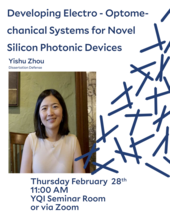Event time:
Wednesday, February 28, 2024 - 10:00am to 11:00am
Audience:
YQI Researchers
Location:
YQI Seminar Room
Event description:
Developing Electro-Optomechanical Systems for Novel Silicon Photonic Devices
The ability to manipulate and control light through photonic integrated circuits (PICs) has enabled transformative advances in classical and quantum computation, communications, imaging, and sensing. Despite these advancements, silicon photonics, the leading platform for integrated photonic systems, still lacks certain key photonic components, such as high-performance optical isolators, circulators, frequency shifters, and signal processing units. This dissertation addresses these limitations by integrating photonic, phononic, and electronic elements into a chip-scale solution.
We introduce a range of electro-optomechanical systems within silicon photonics, leveraging the unique properties of an Aluminum-on-Silicon-On-Insulator (AlN-on-SOI) platform for its exceptional piezoelectric characteristics and CMOS compatibility. We employ strategic acoustic confinement to reduce energy dissipation and optimize electromechanical and optomechanical coupling, leading to the development of novel, high-performance silicon photonic devices.
Our work introduces a highly efficient intermodal electro-optomechanical scattering system that fosters strong photonic band coupling, facilitating Rabi-like energy exchanges and nonreciprocal band hybridization. This system not only improves the operational bandwidth of optical isolators by over 80-fold compared to existing technologies but also achieves optical frequency translation capabilities on par with commercial fiber-integrated systems.
Further enhancements extend the isolator’s bandwidth to 2 THz, achieving more than a 2700-fold improvement over previous integrated non-magnetic isolators. This achievement is realized by tailoring the system’s dispersion properties using a multi-mode interferometer system.This isolator is distinguished by its CMOS compatibility, broad operational bandwidth, low insertion loss, wavelength tunability, and direction reconfigurability, which we believe holds the potential to become a standard toolkit in photonic development libraries.
Furthermore, we demonstrate efficient intramodal scattering with the development of an electrically interfaced Brillouin active waveguide, which enables bidirectional microwave-to-optical conversion. This system, characterized by the amplitude-preserving properties of intramodal Brillouin scattering, facilitates non-destructive microwave photonic analysis and supports versatile strategies in remote sensing, channelization, and spectrum analysis within the domain of microwave photonics.
The contributions of this work underscore the versatility and potential of electro-optomechanical systems in enriching silicon photonics. Looking forward, further exploration of this platform could lead to the discovery of new electro-optomechanically induced optomechanical dynamics and even more functionalities.
The Committee members are:
Prof. Peter Rakich
Prof. Hui Cao
Prof. Owen Miller
Prof. Logan Wright
